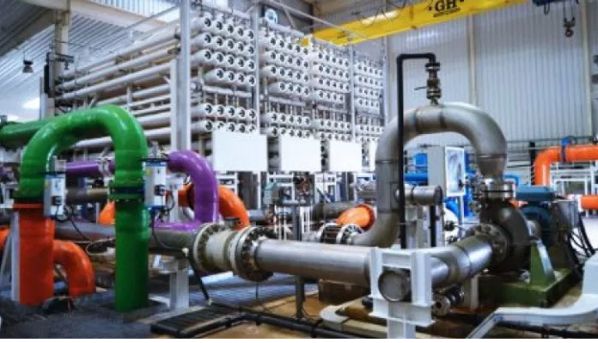
Desalination Plant to resume operations March
The Director of Communications of the Ghana Water Company Limited (GWCL), Mr Stanley Mantey, says he is optimistic that the Teshie Desalination Plant, which treats sea water for domestic and commercial use, will resume operations by the end of February.
He said that was premised on the possible successful conclusion of the renegotiation of the agreement between the GWCL and Befessa, owners of the plant.
In an interview in Accra last Sunday, Mr Mantey also promised that the outcome of the renegotiation would be made known to the public.
The Teshie Desalination Plant Agreement was signed between the GWCL and Befessa on a build, own, operate and transfer (BOOT) basis in February 2011.
The plant was built in February 2015 to address water supply shortfalls, particularly in the Teshie-Nungua area.
In spite of its construction, some residents still complain of water shortages.
Residents
Some residents of Teshie who spoke to the Daily Graphic appealed to the government and the GWCL to speed up negotiations and find a permanent solution to their water supply challenges.
They explained that since January last year they had been experiencing water supply disruptions, which had since not improved.
One of the residents, Ms Joyce Amponsah, explained that the Teshie community had not experienced frequent flow of water for two years now, a situation she described as worrying.
Another resident, Gifty Appiah, said since 2017 they had had water flow through their taps only on Wednesdays and Sundays.
“There was a time in December last year when we did not have water flow through our taps for weeks and we did not receive any information as to what the problem was,” she said.
Another resident, Mr Desmond Adjei, appealed to the government to address the water treatment plant issue to save the GWCL from accruing more unnecessary debts.
Petition
The Public Utility Workers Union (PUWU), a stakeholder, sent two petitions to the government in 2015 and January this year to propose a new agreement.
According to the petition, the GWCL bought water from the plant at GH¢6.75 per cubic metre, which was against the PURC approved tariff for water which was GH¢1.47 per cubic metre, a huge tariff differential of GH¢5.28 per cubic metre.
It described the agreement as needless, stating that the Kpong water expansion works were started at the time the desalination plant was introduced, which should have been sufficient to meet the deficit required to improve the supply of water for Accra.
It explained that the GWCL had, since the operation of the plant, been incurring debt under the contract signed in February 2011 with Befessa.
Checks from the GWCL show that in the absence of the desalination plant, the people of Teshie-Nungua take their supply from the Kpong and the Weija treatment plants.
According to the PUWU, the plant, which began operations in February 2015, had since its operations brought about a major drain on the coffers of the GWCL.
The GWCL buys water produced at the plant for distribution to residents of Teshie-Nungua and surrounding communities.
The water was sold in bulk to the GWCL, the offtaker, at $1.50 or GH¢6.75 per cubic metre as of 2015.
The GWCL was also to pay a monthly capacity charge of GH¢5.82 million to Befessa, even during periods when the plant was not in production.
The petition said from February to August 2015, the GWCL received GH¢5.72 million from the sale of water from the plant, as against an expenditure of GH¢48.68 million.
PUWU
The General Secretary of PUWU TUC, Mr Michael Adumatta Nyantakyi, told the Daily Graphic that the plant had also not contributed any positive outcomes to the operation of the GWCL but rather piled up debt and losses on the company.
He stated that the GWCL had accumulated debt of $10 million that needed to be paid.
“As key stakeholders, we have observed this trend and we think that the rate at which the debt is piling up has the potential to affect not only the plant but also other supply systems of the GWCL, which can lead to a major water crisis across the country,” he said.
“In 2015, just about six months after it started operating, we sent a petition to then President John Dramani Mahama, drawing his attention to the bills and debts that were accumulating and for him to take some action.
He explained that, on the average, the monthly cost for the operation of the desalination plant was equivalent to GH¢11 million.
“The whole agreement, when you look at it, was skewed to favour the private operator and the debt from the desalination plant continues to pile up on the GWCL.
Funds which are mobilised from other operational regions of the GWCL are being used to pay the debts,” he lamented.
He said the agreement was flawed technically and financially and urged that some serious investigations be conducted to find out if the country was shortchanged.
Rehabilitation
Meanwhile, the plant is undergoing a major rehabilitation for it to produce at maximum capacity.
When completed, the plant, which has been shut since January 2018, is expected to produce about 60 million litres of water per day to serve the water supply needs of more than 250,000 residents of Teshie-Nungua and surrounding communities.
A team from the Daily Graphic which visited the plant saw some workers of Abengoa, the Spanish multinational company in charge of operating the plant, working on the intake valves.
A source at the plant that declined to be named because he did not have the authority to speak explained to the Daily Graphic that the workers were undertaking rehabilitation works and not producing water.
